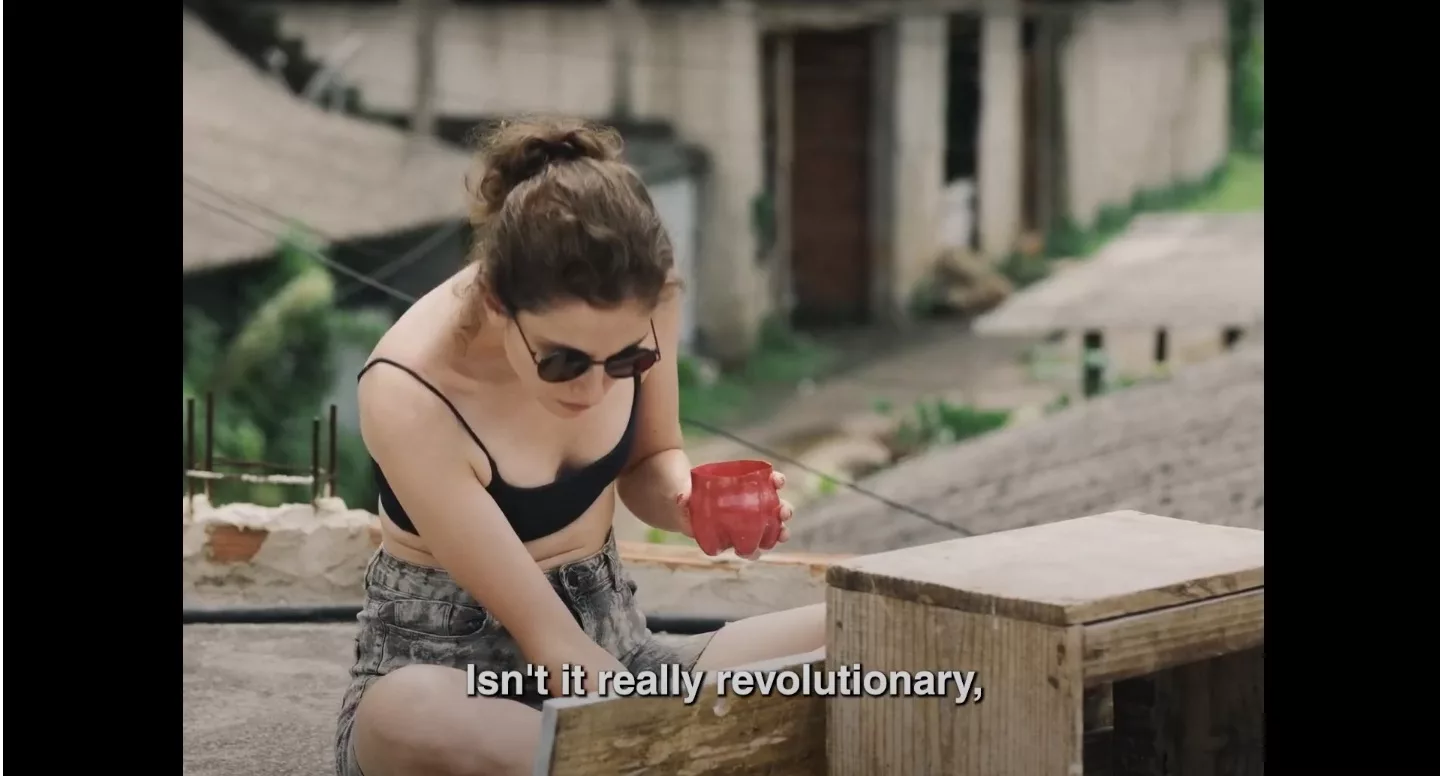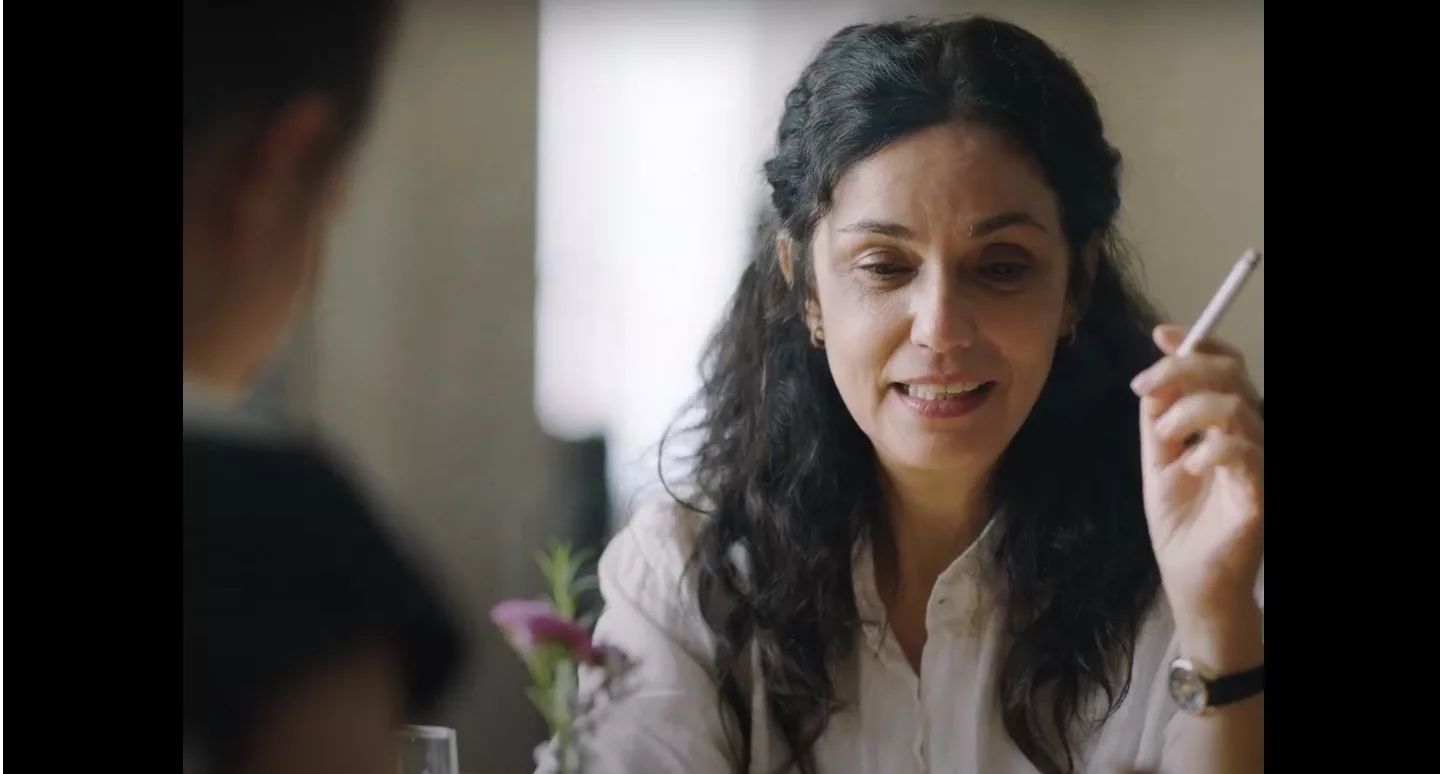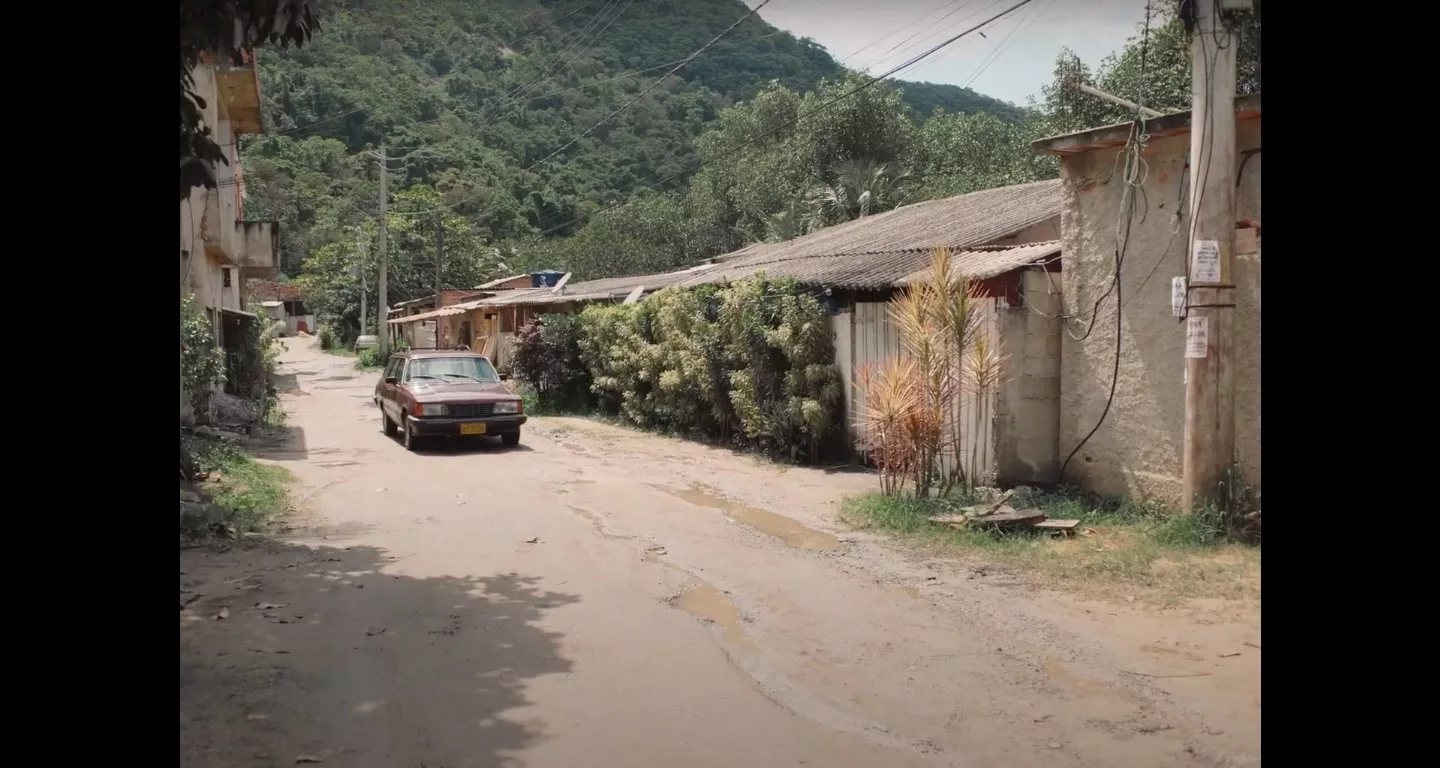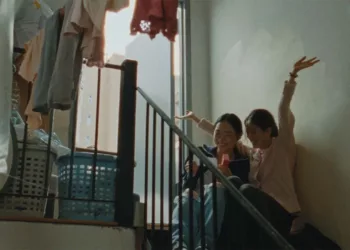Malu is an intimate family drama that gives viewers a raw, complex glimpse into the lives of three generations of women in 1990s Brazil. Written and directed by Pedro Freire in his feature debut, the film revolves around Malu, a fiery 50-year-old actress struggling to fulfill her artistic dreams. Though eccentric and volatile, Malu opens her dilapidated Rio de Janeiro home to her conservative elderly mother Lili and adult daughter Joana, recently returned from abroad.
What unfolds is a portrait of love as tempestuous as the summer storms that roll through the city. Simmering traumas and ideological clashes explode in emotional outbursts between Malu, Lili, and Joana, whose differences span political eras and artistic ambitions. Yet an undeniable affection also pulls them back together, unable to separate despite the mutual hurt. It becomes clear these women are bonded not just by blood, but by their unwillingness to conform to society’s constraints on them as dissidents, artists, and women.
Inspired by his own mother and her tumultuous relationships, Freire stokes the flames of this family drama by keeping his camera tight on the trio’s riveting performances. With empathy and authenticity, Malu poses thoughtful questions about the cycle of resentment passed between generations of mothers and daughters.
A Volcanic Turn by Yara de Novaes as Malu
In a volcanic performance, Yara de Novaes makes Malu an unpredictable live wire of a woman whom viewers cannot peel their eyes away from. She fully inhabits the lust for life and volatility of Pedro Freire’s eccentric protagonist, crafting a magnetic characterization that earns our empathy despite her most self-destructive tendencies.
Whether holding court about her artistic visions or unleashing vitriol at her loved ones, de Novaes makes clear Malu is always perched on the knife’s edge of her emotions. Her moods turn on a dime between joyful optimism and bitter resentment, both towards the world and her own unsatisfying lot in life. Yet even at her most vicious, spewing inventive vulgarities that would make a sailor blush, de Novaes instills Malu with a wounded humanity that touches our hearts. Beneath her dramatic posturing and radical politics simmers a disappointment that her talents have never been fully recognized or rewarded.
Showing tremendous acting range, de Novaes oscillates between high comedy and intense drama sometimes within the same scene. When a priest comes to lecture Malu on her morals, she mischievously implies he might be a closeted pedophile in a playful monologue that crescendos into a physical attack from her outraged mother. The whiplash between belly laughs and gasps is a testament to de Novaes’ complete command over the audience’s shifting sympathies. No matter what outrageous scenarios Freire dreams up, his leading lady makes us feel every outlandish beat.
By turns electric, monstrous, and magnetic as Malu, Yara de Novaes gives the performance of a lifetime. Whether you adore or abhor Malu as a protagonist, de Novaes demands your rapt attention.
Commanding Support from Family and Friends
While Yara de Novaes no doubt dominates the screen as the larger-than-life Malu, she receives formidable support from the small but talented cast surrounding her. As Malu’s conservative mother Lili, Juliana Carneiro da Cunha provides an excellently subtle counterpoint with her judgmental looks and cutting remarks. Yet da Cunha reveals hidden depths in a wrenching monologue confessing a traumatic experience from Lili’s past, lending empathy to this otherwise rigid woman.
As Malu’s daughter Joana, Carol Duarte serves as the grounded moral core trying to mediate the clashing egos under this temperamental roof. Though given less flashy drama than her co-stars, Duarte ably depicts Joana’s struggle to assert her own identity as a rising actress shadowed by her mother’s legend. Meanwhile, Átila Bee fabulously plays Tibira, Malu’s closest confidante and fellow starving artist. Tibira bears the brunt of Lili’s racist, homophobic barbs with scintillating wit and style.
By keeping the cast intimate with just two primary locations, writer-director Pedro Freire fosters an immersive sense of family dysfunction. We come to know Malu, Lili, Joana, and Tibira as complicated, contradictory human beings tied together by bonds of love and resentment. Thanks to raw, intimate performances across the board, their passions ring achingly true.
Dive deep into the complexities of family and grief with our Seagrass review. Meredith Hama-Brown’s feature debut unfolds the story of a family grappling with loss, set against the haunting beauty of the Pacific Northwest. Ally Maki delivers a riveting performance as Judith, whose struggle to connect with her heritage and mend her marriage takes center stage. This indie film skillfully blends troubled family dynamics with a touch of ethereal horror, exploring the fragile nature of human connections and memory.
Capturing Raw Intimacy on a Modest Budget
While clearly operating with a restrained budget, writer-director Pedro Freire makes the most of his resources to craft an intimate visual style that suits this raw family drama. Cinematographer Mauro Pinheiro Jr. lenses the film in a boxy 4:3 aspect ratio, keeping shots deliberately tight on his captivating cast. As Malu, Lili, and Joana trade barbs and confessions, we feel almost uncomfortably close to the action, like flies on the wall witnessing private turmoil. The narrow framing reinforces the cramped nature of their lives, with happiness and heartbreak colliding under the same unstable roof.
Through his lighting and production design, Pinheiro evocatively captures both the hope and hardship coursing through this household. Golden late afternoon light filtering into the perpetually cluttered rooms suggests the warmth generated by this family’s imperfect love. Yet cold blue tones creep in during arguments staged in the shadowy corridors and staircases of Malu’s dilapidated home, hinting at the bruising damage inflicted by their bitter words. Between night and day, darkness and illumination perpetually alternate to reflect the characters’ ever-shifting emotional states in response to each other.
Thanks to raw DIY production values mirroring his characters’ struggles, Freire relies on tour de force acting to sell this ambitious drama on a shoestring budget. Shooting on location with limited lighting and camera setups only heightens the authenticity.
A Toxic Bond Between Generations
At its core, Malu is an exploration of the complex, toxic yet undeniably loving relationships between mothers and daughters. Pedro Freire examines three generations of women bonded by blood and trauma, who hurt each other deeply but cannot ultimately abandon one another. Their differences in ideology, artistic ambition, and womanhood itself become flashpoints that regularly explode in emotional outbursts.
These clashes play out between Malu and Lili, whose conservative Catholicism directly counters her daughter’s radical leftist politics and hedonistic lifestyle. Accusations fly fast as Lili blames Malu’s artistic struggles on drug use, while Malu resents her mother’s racism and homophobia towards Malu’s fellow starving artist housemates. Yet when Lili makes a shattering confession of childhood abuse, Malu still embraces her mother in solidarity.
A similar push and pull dynamic also strains Malu’s connection with her own daughter, Joana. Having grown up with an inconsistent mother consumed by artistic passion, Joana calls out Malu’s “Malu-ism” philosophy as selfishly using progressivism to justify her neglectful parenting. But Joana equally admires and resents her mother’s boldness in speaking truth to power. For Malu, Joana represents a more cautious generation she simultaneously envies and pities.
These resentments have calcified from repetitions of trauma between mothers and daughters across the decades. Lili continues damaging patterns from her own upbringing upon Malu, who then unintentionally inflicts similar harm on Joana. The question Freire poses is whether this cycle can ever be broken – or if some degree of pain is inherent to the familial bond between women.
By bracingly testing audience sympathies for wounded characters on all sides, Malu makes a compelling case for intergenerational understanding. Even through bitterness and blame, the love at the core is evident. Forgiveness may enable escaping the shadow of inherited ghosts.
Uneven Storytelling Anchored by Raw Emotion
While Pedro Freire demonstrates considerable promise as a first-time writer-director, Malu does suffer from some uneven pacing and tricky narrative structure. The film lacks concrete timestamps, so viewers must pay close attention as the story hopscotches through an unspecified period of months. The transitions between certain scenes feel abrupt, leaving gaps that require some mental catch-up to fill in the blanks of what transpired with the characters in the interim.
What anchors the pacing is the sheer emotional velocity of the performances, capturing feel like painful truths. When Malu unleashes torrents of vulgar vitriol or her mother Lili confesses childhood horrors, we comprehend the seismic shifts happening internally even when external events are unclear. The plot mechanism that forces the estranged Malu and Joana to reunite feels a touch contrived. Yet their tender reconciliation scene resonates with such palpable catharsis due to the strength of the central relationship.
While the nuts and bolts storytelling could demonstrate more finesse, the messy, unvarnished emotions on display retain their power. Malu is less concerned with narrative precision than with exploring the complicated messiness of family bonds. For both better and worse, Freire allows his dynamite cast to provide the film’s spectacle rather than storytelling spectacle. Raw intimacy and honesty shine through.
Imperfect Bonds That Endure
Boasting tremendous heart beneath the dramatically dysfunctional exterior, Malu remains an insightful examination of the complex bonds between mothers, daughters, and the ghosts of generations past. Pedro Freire has crafted a promising debut feature that announces the arrival of a compassionate new cinematic voice willing to pose thoughtful questions about resentment and regret poisoning familial ties.
While the fiercely partisan Malu seems to share little common ideological ground with her conservative mother Lili or ambitious daughter Joana, much less mutual understanding, their willingness to eventually embrace reveals the commitment underlying their differences. These relationships may be profoundly imperfect, leaving lasting wounds that spur cycles of trauma, yet an ineffable love endures despite clashes around politics, artistry, and womanhood itself.
What makes Malu linger in the mind long after the credits roll is how Freire avoids definitive answers, instead leaving audiences to marinate on whether such hurt can ever be truly overcome between generations or even fully comprehended from one era to the next. The bittersweet closing moments suggest that with age comes perspective and perhaps the only hope is for progress through the passage of time, as the young eventually assume caretaking duties for their complex elders.
By keeping his cast intimate and his camera claustrophobically close on captivating performances, Freire has announced himself as a director willing to capture messiness and ask tough questions. While the technical finesse catches up to the ambitious emotional heights, the humanity still resonates loud and clear. Malu is a promising debut heralding an insightful new cinematic voice that respects the audiences’ intellect while still being approachable. We eagerly await what Freire has to say next about reconciling past and future.
The Review
Malu
Raw, reckless, and resonantly real, Malu announces an auspicious debut for writer-director Pedro Freire. Centered on three generations of women bonded by toxicity yet unable to abandon each other, this compassionate family drama sinks its teeth into thoughtful questions about the resentments we inherit and how the traumas of the past reverberate into the future. Buoyed by volcanic performances and willingness to embrace messy imperfection, Malu heralds the arrival of an insightful new cinematic voice.
PROS
- Powerful lead performance by Yara de Novaes
- Strong supporting cast
- Authentic exploration of complex family relationships
- Poses thoughtful questions about cycles of trauma
- Strong directorial debut for Pedro Freire
- Emotionally resonant and moving
CONS
- Uneven pacing and abrupt transitions
- Lacks clear timestamps so following the timeline is challenging
- Plot convenience of what forces a mother-daughter reunion
- Technical execution doesn't always match ambition




























